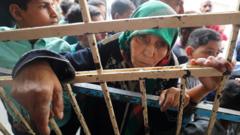The Trump administration escalates deportation efforts targeting foreign students critical of U.S. actions, detailing new protocols for social media vetting in visa applications.
U.S. Diplomats Directed to Monitor Social Media of Visa Applicants Amid Deportation Crackdown

U.S. Diplomats Directed to Monitor Social Media of Visa Applicants Amid Deportation Crackdown
In a controversial move, Secretary of State Marco Rubio mandates social media scrutiny for visa applicants linked to dissent against U.S. policies.
April 1, 2025 - In an unprecedented directive from Secretary of State Marco Rubio, U.S. diplomats are now required to examine the social media activity of some student and exchange-visitor visa applicants. This decision comes in the wake of heightened deportation efforts initiated by President Trump, aiming to remove individuals perceived as harboring anti-American sentiments or challenging the government's stance on international issues, particularly regarding Israel's recent conflict with Gaza.
This mandate, conveyed via a cable dispatched to diplomatic missions on March 25, aligns with a broader campaign launched by Trump to expel foreign citizens deemed to pose a threat to national security and public safety. Among these efforts is an executive order allowing the deportation of international students participating in protests or expressing dissent about U.S. foreign policy, which has sparked controversy among various advocacy groups and civil rights organizations.
According to two U.S. officials familiar with the cable's contents, consular officials must now send certain visa applicants to the embassy's fraud prevention unit for mandatory social media assessments. These procedures are designed to identify any "hostile attitudes" exhibited online toward American culture or governmental operations.
In a recent interview with CBS News, Rubio emphasized the need for stringent oversight, stating, “We don’t want people in our country that are going to be committing crimes and undermining our national security.” This statement underscores the administration's commitment to an exclusionary policy that prioritizes surveillance over inclusiveness in the U.S. visa system.
As the debate surrounding freedom of expression and immigration intensifies, critics argue that such measures stifle dissent and violate fundamental rights. The ramifications of this policy shift may significantly alter the landscape of international student relations, compelling prospective students to reconsider their applications amidst fears of scrutiny and potential exclusion based on their social media presence.
This mandate, conveyed via a cable dispatched to diplomatic missions on March 25, aligns with a broader campaign launched by Trump to expel foreign citizens deemed to pose a threat to national security and public safety. Among these efforts is an executive order allowing the deportation of international students participating in protests or expressing dissent about U.S. foreign policy, which has sparked controversy among various advocacy groups and civil rights organizations.
According to two U.S. officials familiar with the cable's contents, consular officials must now send certain visa applicants to the embassy's fraud prevention unit for mandatory social media assessments. These procedures are designed to identify any "hostile attitudes" exhibited online toward American culture or governmental operations.
In a recent interview with CBS News, Rubio emphasized the need for stringent oversight, stating, “We don’t want people in our country that are going to be committing crimes and undermining our national security.” This statement underscores the administration's commitment to an exclusionary policy that prioritizes surveillance over inclusiveness in the U.S. visa system.
As the debate surrounding freedom of expression and immigration intensifies, critics argue that such measures stifle dissent and violate fundamental rights. The ramifications of this policy shift may significantly alter the landscape of international student relations, compelling prospective students to reconsider their applications amidst fears of scrutiny and potential exclusion based on their social media presence.



















